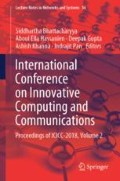Abstract
Relationships patterns between social entities in the social network are the main attribute that plays important role in our lives. They are mostly complex in nature and uncertain to find out. To quantify these relationships, patterns is a very potent issue in social networks analysis. This paper proposes a robust function that finds the relationships between groups of finite size based on fuzzy graphs theory. The relationship among elements in-group is found out by using the arithmetic mean or geometric mean. This paper has taken advantages of both weighted arithmetic and geometric mean, which combines the advantage of both arithmetic and geometric mean. The weights taken are the function of the importance of both the social elements participating in a term. These weights can be the parameters like the betweenness centrality or closeness centrality.
Access this chapter
Tax calculation will be finalised at checkout
Purchases are for personal use only
References
Faust, K, Wasserman S (1994) Social network analysis: methods and applications, 8th edn. Cambridge University Press
Hanneman RA, Riddle M, Robert A (2005) Introduction to social network methods. University of California Riverside
Yager RR (2008) Intelligent social network modeling and analysis. In: 3rd international conference on intelligent system and knowledge engineering-2008. ISKE 2008, pp 5–6
Rani P, Bhatia MPS, Tayal DK (2018) Different aspects & potential challenges in social networks. In: 3rd international conference on information, communication and computing technology (ICICCT-2018), Springer, 2018, pp 1–12
Rani P, Bhatia M, Tayal DK (2017) An astute SNA with OWA operator to compare the social networks. Int J Inf Technol Comput Sci
Rani P, Bhatia M, Tayal DK (2018) Qualitative SNA methodology. In: Proceedings of the 12th INDIACom and 5th international conference on computing for sustainable global development
Brunelli M, Fedrizzi M (2009) A fuzzy approach to social network analysis. In: ASONAM’09. international conference on advances in social network analysis and mining, 2009, pp 225–240
Brunelli M, Fedrizzi M, Fedrizzi M (2011) OWA-based fuzzy m-ary adjacency relations in social network analysis. Springer
Brunelli M, Fedrizzi M, Fedrizzi M (2014) Fuzzy m-ary adjacency relations in social network analysis: optimization and consensus evaluation. Inf Fusion, Elsevier, 17, 36–45
Zadeh LA (1965) Fuzzy sets. Inf Control 8(3):338–353
Rosenfeld A (1975) Fuzzy graphs. In: Zadeh LA, Fu KS, Shimura M (eds) Fuzzy sets and their applications. Academic Press, New York
Graph_theory @en.wikipedia.org. https://en.wikipedia.org/wiki/Graph_theory
Scott J (2012) Social network analysis Sage Publishers
Author information
Authors and Affiliations
Corresponding author
Editor information
Editors and Affiliations
Rights and permissions
Copyright information
© 2019 Springer Nature Singapore Pte Ltd.
About this paper
Cite this paper
Rani, P., Bhatia, M.P.S., Tayal, D.K. (2019). A Soft Computing-Based Approach to Group Relationship Analysis Using Weighted Arithmetic and Geometric Mean. In: Bhattacharyya, S., Hassanien, A., Gupta, D., Khanna, A., Pan, I. (eds) International Conference on Innovative Computing and Communications. Lecture Notes in Networks and Systems, vol 56. Springer, Singapore. https://doi.org/10.1007/978-981-13-2354-6_19
Download citation
DOI: https://doi.org/10.1007/978-981-13-2354-6_19
Published:
Publisher Name: Springer, Singapore
Print ISBN: 978-981-13-2353-9
Online ISBN: 978-981-13-2354-6
eBook Packages: Intelligent Technologies and RoboticsIntelligent Technologies and Robotics (R0)

